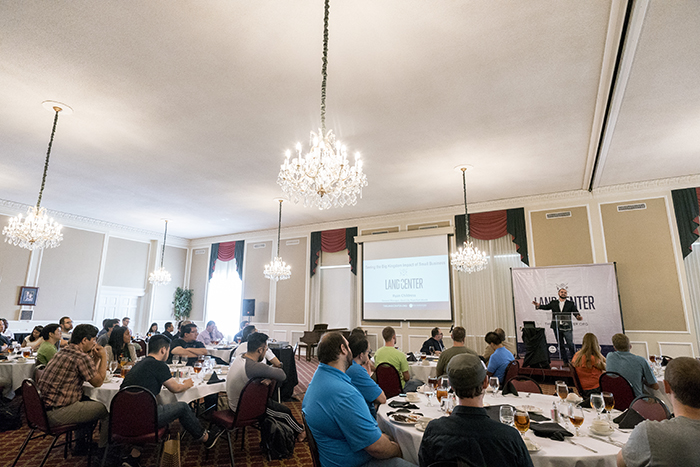Steel City Pops manager explores Kingdom impact of small businesses

One Sunday morning, an openly agnostic man visited Hulen Street Church in Fort Worth. As he later explained to the pastor, this visit was prompted by a recent trip to Steel City Pops.
“He said he had visited Steel City Pops one day and just noticed something different about how the managers and employees treated one another,” explains Ryan Childress, general manager of Steel City Pops’ Fort Worth location. “The young man knew that some of the team members there were believers, and he recognized that they had something that he didn’t have. So randomly enough, he ended up at [Hulen Street Church] to check this ‘Jesus thing’ out.”
Childress shared this story at Southwestern Seminary’s first Land Center luncheon of the fall semester, Sept. 20, concluding, “I don’t know if this man found the truth, but he saw Christ through our business, and we had no idea that that was even happening.” Childress spoke on the topic of “Seeing the Big Kingdom Impact of Small Business,” using his own experience at Steel City Pops—a dessert shop with multiple locations across the country—as an illustration of how God uses ordinary things and ordinary people to do extraordinary things.
Recounting his early experience in managing Steel City Pops, Childress said he eagerly anticipated the ministry opportunities the work would provide, but after a full year of late nights, early mornings, and sometimes-overwhelming busyness, he sensed that no such opportunities were arising. “I began to wonder how the Lord was ever going to use me for the Kingdom when I was so buried in this type of work,” he said.
Over time, however, he began to see that God was indeed working within his business, though not in the way Childress expected. “We had really big plans about what we were going to do one day for the Kingdom,” Childress said, “but where we began to see the Lord work most was through the small things; through the very ordinary; through things that we weren’t even aware could be used for Kingdom impact. I have seen the Lord work the most in our small business context through daily faithfulness in meetings, emails, and simple interactions with employees.”
One of their employees, for example, who worked at Steel City Pops as a high school student, was later baptized at the church she attended in her college town. When sharing her testimony with the church, she said her time at Steel City Pops impacted her spiritual formation.
“That was honestly a surprise to me,” Childress recalled upon hearing the student’s testimony. “She had learned a lot about Jesus through her time there, and I can promise you that did not come through a lot of open discussions about Christ in the workplace; it happened through the Gospel being lived out amongst our team and the fruits of the Spirit being shown.”
Childress clarified that while it is important to speak the Gospel as well as live it out, he has found that God has worked the most in his life through ordinary, everyday interactions. “He’s worked through my weakness and my fatigue,” Childress continued, “and we’ve learned to be faithful in the daily work to let Him open the doors for redemptive work.”
Noting that the majority of churchgoers operate within a secular work environment, Childress provided three ways for ministers to encourage them in their daily work. Specifically, he invited ministers to help their people see the value of their vocation, build relationships at work, and see how God works in the ordinary.
“God desires to use all work for His glory, no matter how insignificant it may seem,” Childress said. “… When your church members feel beaten down and overwhelmed in the mundane, please encourage them to press on for the sake of God’s glory.”
As a special treat for those who attended the luncheon, Childress provided everyone with a free pop. Additionally, everyone in attendance received three free e-books, courtesy of the Land Center.
The next Land Center luncheon will take place Oct. 12 and feature Madison Grace, assistant professor of Baptist history and theology at Southwestern.



